Wednesday, 29 April 2009
I do not like to eat bread or pastries of any kind. My mother, on the other hand, adores bread. However, she is fairly picky over the bread she chooses for breakfast. She buys only one kind of bread - the ones from Silver Hills bakery. As notified on the packaging from the last loaf she bought, I knew the whole range of bread was to be repackaged. It makes sense, since I have difficulty distinguishing between this particular brand and the slew of others in the bread aisle at the local supermarket. A package redesign should curb just that.
I was not mistaken:
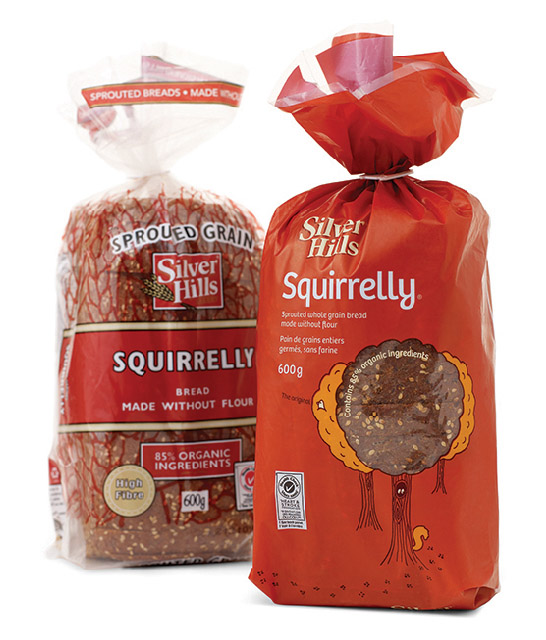
Designed by Karacters in Vancouver, these new packaging designs certainly stand out from the rest on the shelves. Karacters “researched how well Silver Hills’ brand was recognized and discovered that its ‘Squirrelly’ bread had a higher brand power then the Silver Hills company brand. Karacters then decided to rename each of Silver Hills’ bread types with a unique name. The new names were all created within DDB and were designed to tell the stories of the different breads. The new names include: Big 16, Hardy Hearty Harvest, Hemptation, Kings Kamut, Little Big Bread, Mack’s Flax, Marvelous Multi, Radient Raisin and Steady Eddie. Even the pack copy has been changed to have an individual tone for each of the products.” (Design Edge)
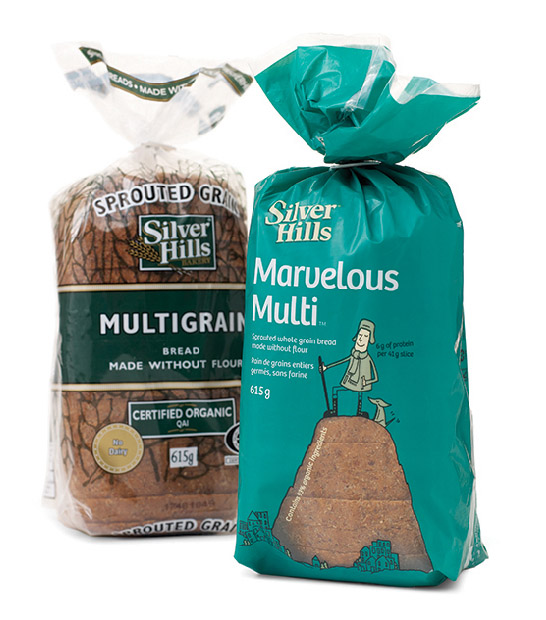
These packaging designs are unique because they all use bags in solid colours, as opposed to the standard clear bags with crude graphics of wheat. “Human instinct is that you are attracted to nice-looking warm things,” James Bateman, Creative Director at Karacters, said about the solid color matte bags. “So we created the bags in natural vibrant tones to really break through a very basic level visually on the shelves.”
“Clear windows were incorporated into illustrations on the packaging to draw curious eyes to the product. The illustrations (by Robert Hanson are apart of the storytelling concept for the different types of breads.” (Design Edge)
Images sourced from The Dieline.
Tags: Packaging
Posted in Uncategorized | No Comments »
Tuesday, 28 April 2009
Being utterly disinterested in automobiles, it is hardly surprising that I encounter difficulty distinguishing between models and makes, and even brands occasionally. But one thing is for sure, I can always point out an Aston Martin. The quintessential Bond car, the Aston Martin simply exudes sophistication and masculinity effortlessly.
Recently, a new model debuted. The Aston Martin One-77 was fully revealed over the weekend at the Concorso d’Eleganza event in Italy. True to its name, only 77 cars are made. Even though priced at £1.5 million each, they are all spoken for.

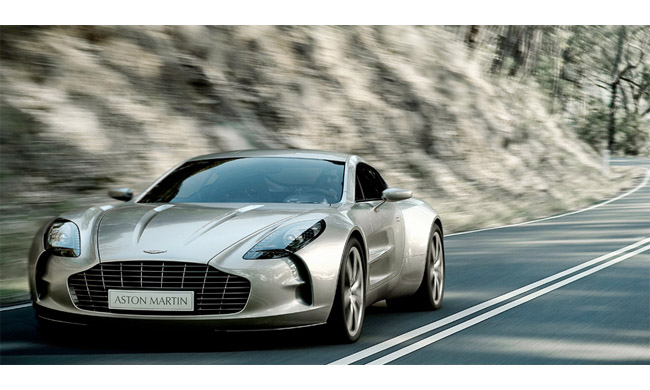
Posted in Uncategorized | No Comments »
Monday, 27 April 2009
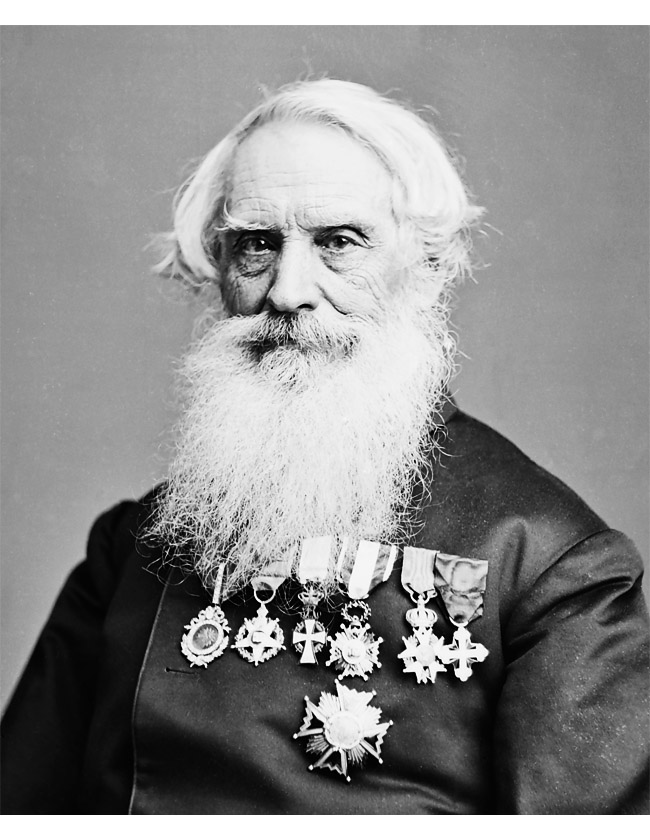
… .- — ..- . .-.. / ..-. .. -. .-.. . -.– / -… .-. . . … . / — — .-. … . / .– .- … / -… — .-. -. / - — -.. .- -.– / .. -. / .—- –… —-. .—- –..– / .. -. / -.-. …. .- .-. .-.. . … - — .– -. –..– / — .- … … .- -.-. …. ..- … . - - … .-.-.- / …. . / .– .- … / - …. . / .- — . .-. .. -.-. .- -. / -.-. .-. . .- - — .-. / — ..-. / .- / … .. -. –. .-.. . / .– .. .-. . / - . .-.. . –. .-. .- .–. …. / … -.– … - . — / .- -. -.. / — — .-. … . / -.-. — -.. . .-.-.- / — -. / - …. . / … . .- / …- — -.– .- –. . / …. — — . / .. -. / .—- —.. …– ..— –..– / — — .-. … . / . -. -.-. — ..- -. - . .-. . -.. / -.-. …. .- .-. .-.. . … / - …. — — .- … / .— .- -.-. -.- … — -. / — ..-. / -… — … - — -. / .– …. — / .– .- … / .– . .-.. .-.. / … -.-. …. — — .-.. . -.. / .. -. / . .-.. . -.-. - .-. — — .- –. -. . - .. … — .-.-.- / .– .. - -. . … … .. -. –. / …- .- .-. .. — ..- … / . -..- .–. . .-. .. — . -. - … / .– .. - …. / .— .- -.-. -.- … — -. .—-. … / . .-.. . -.-. - .-. — — .- –. -. . - –..– / — — .-. … . / -.. . …- . .-.. — .–. . -.. / - …. . / -.-. — -. -.-. . .–. - / — ..-. / .- / … .. -. –. .-.. . / .– .. .-. . / - . .-.. . –. .-. .- .–. …. –..– / .- -. -.. / - …. . / –. .- .-.. .-.. . .-. -.– / — ..-. / - …. . / .-.. — ..- …- .-. . / .– .- … / … . - / .- … .. -.. . .-.-.- / - …. . / — .-. .. –. .. -. .- .-.. / — — .-. … . / - . .-.. . –. .-. .- .–. …. –..– / … ..- -… — .. - - . -.. / .– .. - …. / …. .. … / .–. .- - . -. - / .- .–. .–. .-.. .. -.-. .- - .. — -. –..– / .. … / .–. .- .-. - / — ..-. / - …. . / -.-. — .-.. .-.. . -.-. - .. — -. … / — ..-. / - …. . / -. .- - .. — -. .- .-.. / — ..- … . ..- — / — ..-. / .- — . .-. .. -.-. .- -. / …. .. … - — .-. -.– / .- - / - …. . / … — .. - …. … — -. .. .- -. / .. -. … - .. - ..- - .. — -. .-.-.- / .. -. / - .. — . / - …. . / — — .-. … . / -.-. — -.. . / .– — ..- .-.. -.. / -… . -.-. — — . / - …. . / .–. .-. .. — .- .-. -.– / .-.. .- -. –. ..- .- –. . / — ..-. / - . .-.. . –. .-. .- .–. …. -.– / .. -. / - …. . / .– — .-. .-.. -.. –..– / .- -. -.. / .. … / … - .. .-.. .-.. / - …. . / … - .- -. -.. .- .-. -.. / ..-. — .-. / .-. …. -.– - …. — .. -.-. / - .-. .- -. … — .. … … .. — -. / — ..-. / -.. .- - .- .-.-.-
(-.–. .– .. -.- .. .–. . -.. .. .- -.–.-)
Tags: Tribute
Posted in Uncategorized | No Comments »
Sunday, 26 April 2009
Before highlighting the subject of this entry, I would like to clarify this: I cannot shake off the feeling that, by perceiving religious paraphernalia as objects to be admired as art, I am straying into moral grey area. However, I would be lying if I claimed to never have done so. Religious ‘art’, be it paintings, drawings, prints, architecture, sculpture or even floral arrangements and offerings, are often beautifully presented - worked on painstakingly and affectionately by devotees. That, I find, is, at the very least, one legit reason to celebrate religious paraphernalia as art.
I grew up in a buddhist family. Although we were not particularly religious, we did frequently visit monks who lived in remote mountains excavated to form large cavernous temples. These temples also housed a great number of buddha figures carved directly from the rock, apart from various other ones donated by the public. More often than not, these figures were large-scale sculptures - imposing yet with a certain calmness and serenity across their faces. This realism often left me in awe. This following piece is no different:
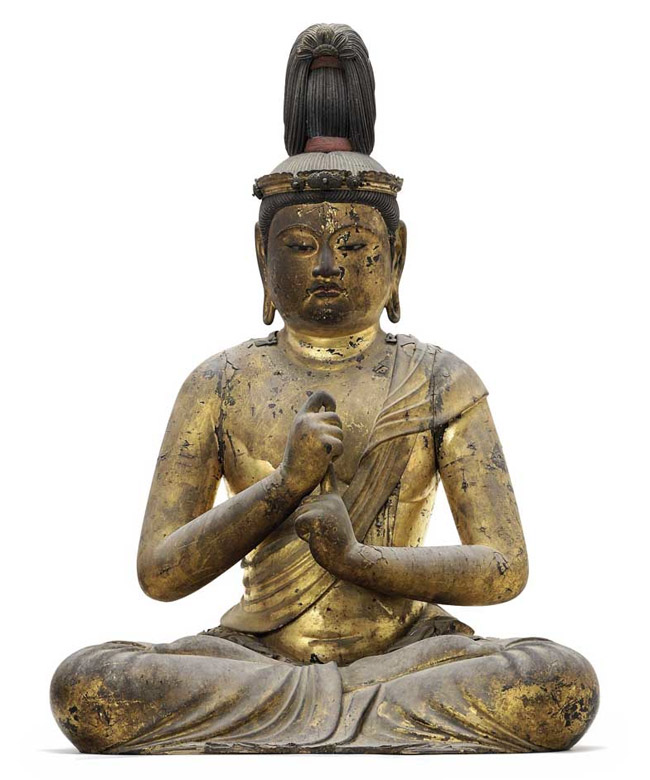
Unkei (1151 – 1223) was a Japanese sculptor of the Kei school. He specialized in statues of the Buddha and other important Buddhist figures. He is also widely recognised by art historians to be the most distinguished of Kei sculptors. He received the title of ‘hoin’ - the highest possible rank for an artist. This sculpture of a seating Dainichi Nyōrai, the Japanese version of Vairocana and the supreme Buddha of the esoteric pantheon, is thought to be Unkei’s masterpiece. “Made of Cyprus wood, he sits on lotus position, with hair piled in a high topknot and wearing the crown and jewelry of royalty. The deity forms a distinctive hand gesture, called ‘knowledge fist’… [X-ray scans show that] the figure contains three dedicatory (a wood five–stage pagoda, crystal ball supported by a bronze stand, and a crystal five-stage pagoda, [representing] Buddhist symbols], sealed inside the torso for over 800 years.” (Art Daily)
This sculpture achieved $14.37 million in auction recently.
Tags: Art, Sculpture
Posted in Uncategorized | No Comments »
Friday, 24 April 2009
“Designers, illustrators, typographers, printers, writers and publishers have collaborated to bring together words, images, type, paper and binding, to express themselves in these works of art,” commented Leah Gordon, Alcuin Society Board member and Design Competition Committee Chair. “All the entries demonstrate that there’s nothing like the look and feel of a well-designed book.”
The fundamental principle of the judging process is that each book must be considered as a total entity. The judges ‘examine every aspect of each book, including the dust jacket, binding, endpapers, half-title page, copyright page, title page, page layout, typography, integration of illustrations, chapter openings, running heads, reproduction of illustrations, clarity of printing, choice of paper, footnotes, and bibliographical references.’ (Alcuin Society)
I must somehow get myself into the judging room next year, seeing as how amazing the entries were this year:
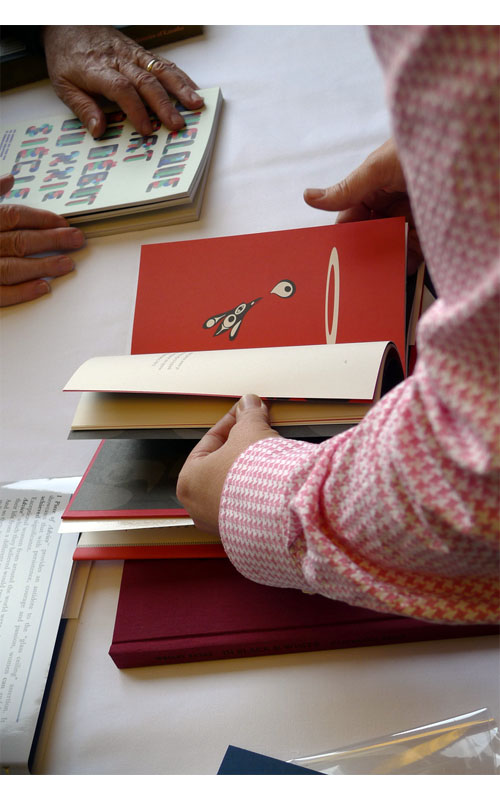
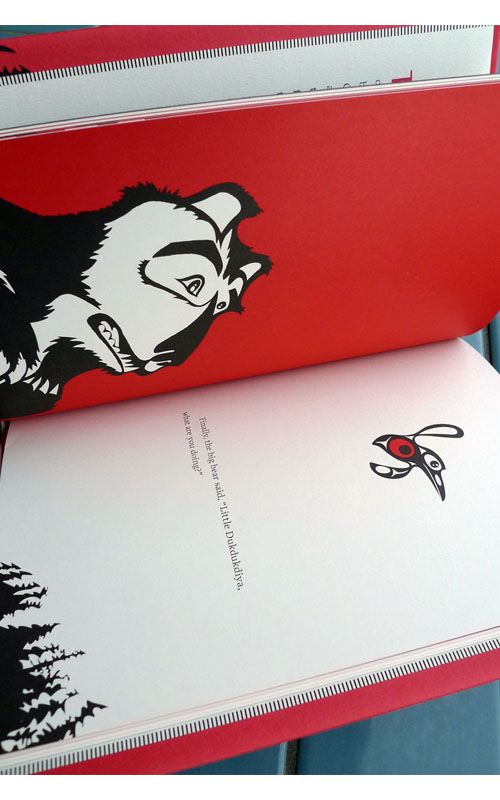
Tags: Book Design
Posted in Uncategorized | No Comments »
Thursday, 23 April 2009
A monotype is essentially a printed painting. It is created by ‘covering a metal plate entirely with etching ink, then removing the ink partially or wholly for the lighter and white areas of the picture being made… If the ink is too thickly applied, it will spread from the pressure when printed, forming a blot; if [it is] too thin [applied], it won’t show up at all. When the picture on the plate is finished, it is run through an etching press with dampened rag paper to form a unique one-of-a-kind print. Almost all the ink transfers fo the paper so it is not possible to make more than one print, hence the prefix mono.’ (Monoprints)
This printing technique also produces a unique translucency that creates a quality of light very different from a painting on paper or a print. The challenge of this technique lies in envisioning and anticipating the final image, since the artwork is prepared spontaneously without any sketches. There is limited control over the result. However, this technique produces beautiful artwork, with effects that cannot be replicated through any other media.
Here are two monotypes by Jim Innes that I thought were exceptionally beautiful.

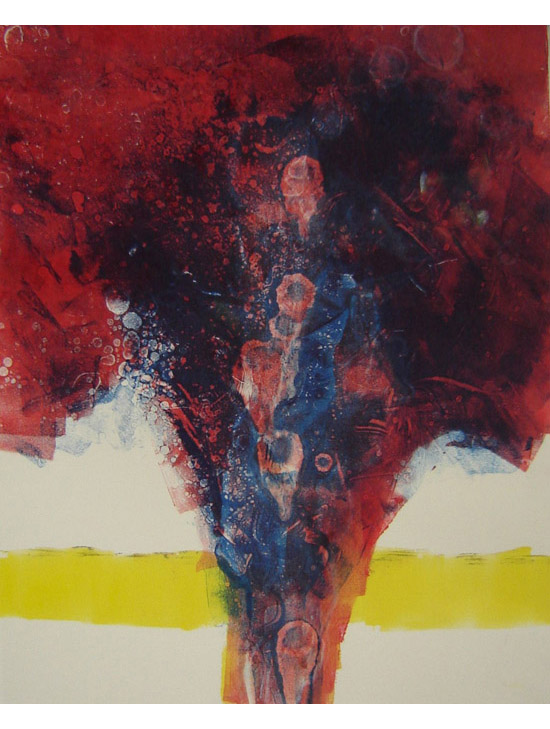
Tags: Art, Printing
Posted in Uncategorized | No Comments »
Wednesday, 22 April 2009
As a product of the 80’s, I know not of the hardship of life without electricity. Life for me has always been padded and punctuated with the luxury of the television, the computer, the radio and other electrically powered devices that I consider essential. It is then no surprise that I often take this small detail for granted. My parents, however, are always quick to point out their childhood memories of oil lamps and kerosene stoves. Thanks to them, I am now highly conscious of my consumption of resources. Perhaps this is why I am particularly interested in GE’s Ecoimagination program.
According to Steve Fludder, GE’s vice president of Ecoimagination, ’smart grid enhancements to the power grid [through the use of their smart meter technology] could result in a five percent reduction of power usage – an amount equal to 41 gigawatts in the United States… The conserved power saved would be equal to the amount consumed by more than 12 million homes over a year’s time.’ (Smart Meters)
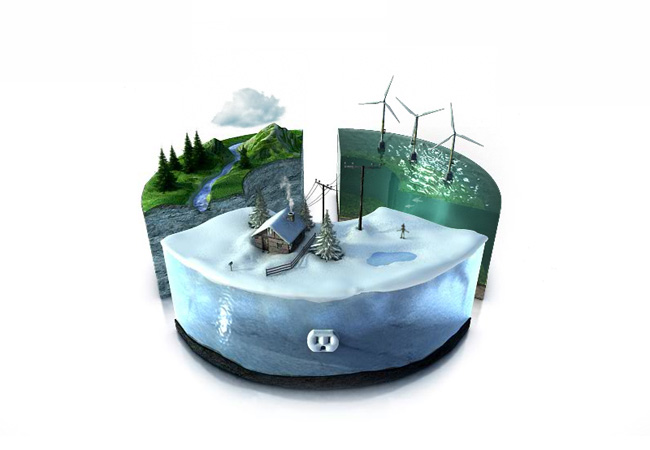
GE has also announced their plans to bring this technology to the 2012 Olympic Games in London. The Olympic Village, where athletes will reside for the duration of the games, will be centrepiece of their implementation plans. Smart meters will be fitted into all the buildings and information output by the smart meters will be displayed for the public to analyse energy consumption for each building. Displaying this smart meter functionality at the Olympics could potentially introduce the technology to a huge audience around the world, and I hope that it will also be adopted in Vancouver in the near future.
GE has set up a website to accompany this initiative, complete with interactive elements to help you understand the (positive) impacts of such technology:

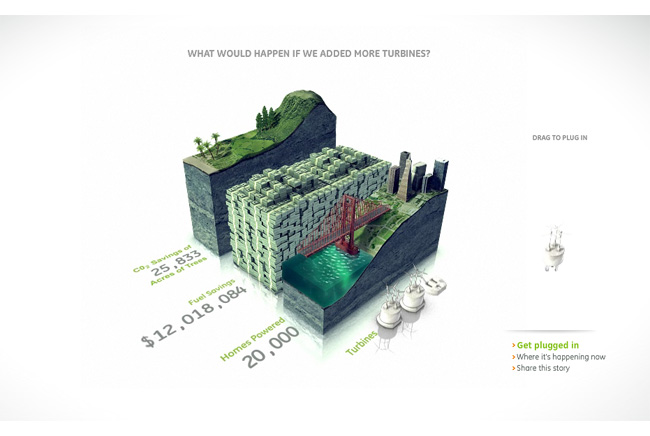
Tags: Concept, Green
Posted in Uncategorized | No Comments »
Wednesday, 22 April 2009
Our climate is no longer what it used to be. That much is known. I may not have been in Vancouver all my life, but I have been told by life-long Vancouverites that winters here in recent years are extremely mild compared to the winters of yesteryears. This is a major concern, not just for our future, but for all the flora and fauna around us.
Founded by US Senator Gaylord Nelson as an environmental teach-in in 1970, Earth Day is now observed as a day to inspire awareness and appreciation for the Earth’s environment. While the entire Earth is affected by our warming climate, the ice caps are hit the worst. Polar bears could face extinction, whales go hungry, and seals have nowhere to rest - all because of the warming Arctic. Here are some (particularly heartbreaking) photographs of this bleak reality:
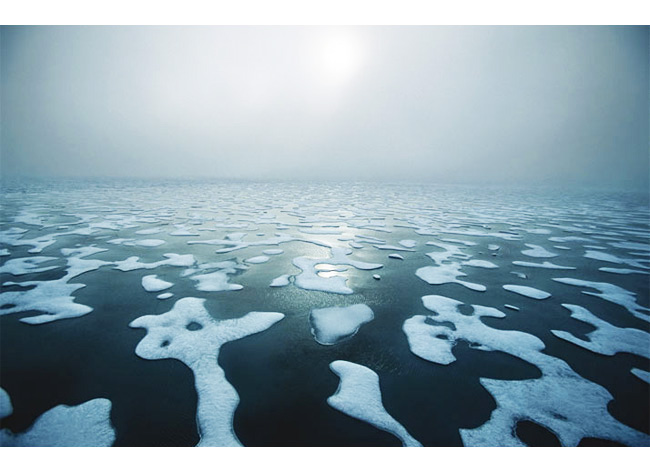
Taken by Paul Nicklen, this picture shows lagoons of meltwater covering the ice on Canada’s Beaufort Sea. Over the past 30 years, Arctic sea ice has thinned as much as 40 percent. (National Geographic)
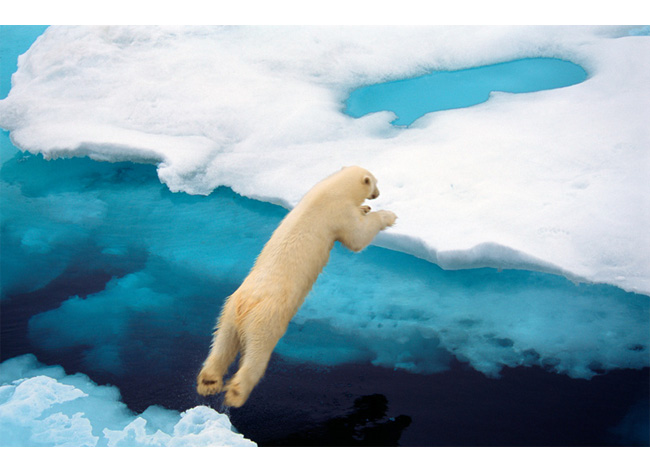
Taken by Ralph Lee Hopkins, this picture shows a polar bear leaping off of sea ice near Devon Island in the Canadian Arctic. Where hey were once able to simply walk across, they now have to resort to leaping and swimming.
Tags: Green, Photography
Posted in Uncategorized | No Comments »
Tuesday, 21 April 2009
Do you know how much waste you produce on a daily basis? And do you know how much of that goes into the rivers, ponds and seas? If you live in an industrialised nation, garbage-filled rivers and seas are certainly unheard of, but unfortunately, it is a common sight in many parts of the world. It becomes not just a toxic wasteland, but also a deathbed for marine animals. Needless to say, the stench is unbearable and the cost to treat the water astronomical.
Chris Jordan is a photographer who knows this all too well. His work frequently centres around our collective impact on the world, in terms of consumerism, mass production and environmental footprint. Not surprisingly, his new series also investigates mass phenomena that occur on a global scale.
“Finding meaning in global mass phenomena can be difficult because the phenomena themselves are invisible, spread across the earth in millions of separate places. There is no Mount Everest of waste that we can make a pilgrimage to and behold the sobering aggregate of our discarded stuff, seeing and feeling it viscerally with our senses. Instead, we are stuck with trying to comprehend the gravity of these phenomena through the anaesthetizing and emotionally barren language of statistics. Sociologists tell us that the human mind cannot meaningfully grasp numbers higher than a few thousand; yet every day we read of mass phenomena characterized by numbers in the millions, billions, even trillions.”
Based on Hokusai’s Great Wave off Kanagawa painting, this series depicts statistics about threats to the world’s marine ecosystems. 2.4 million pieces of plastic was collected from the Pacific Ocean and arranged to resemble the original painting. This number is equal to the estimated number of pounds of plastic pollution that enter the world’s oceans every hour.
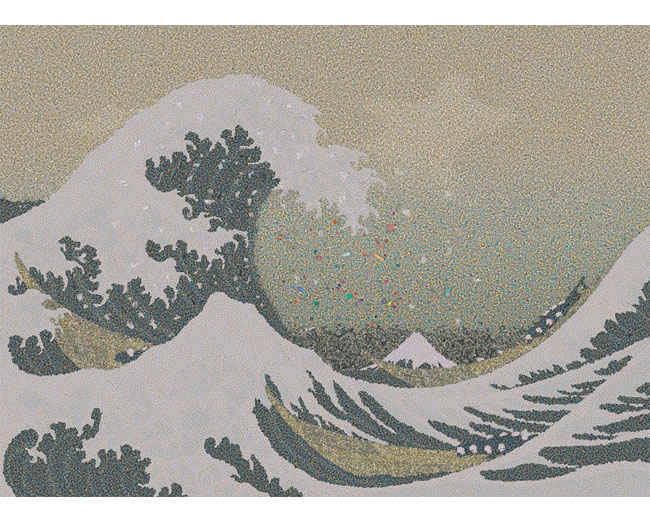
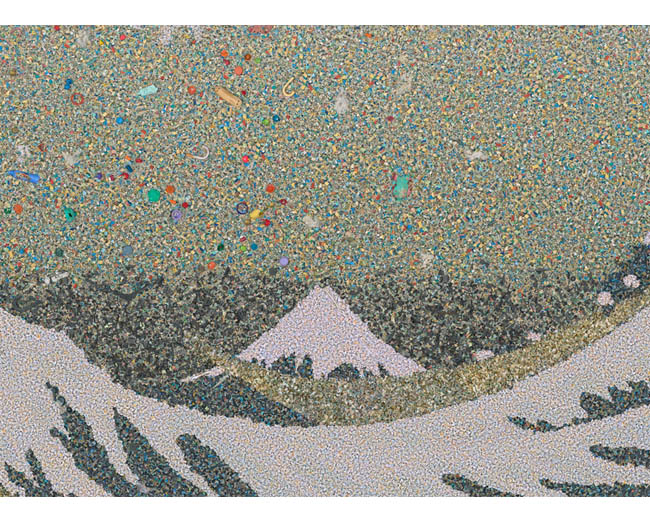
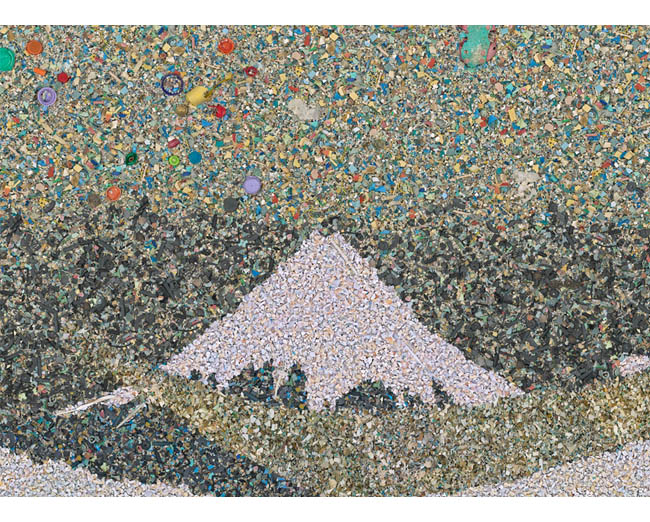
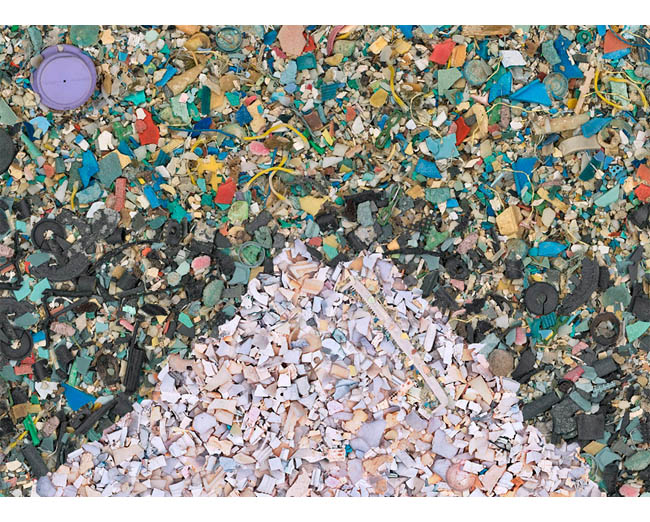
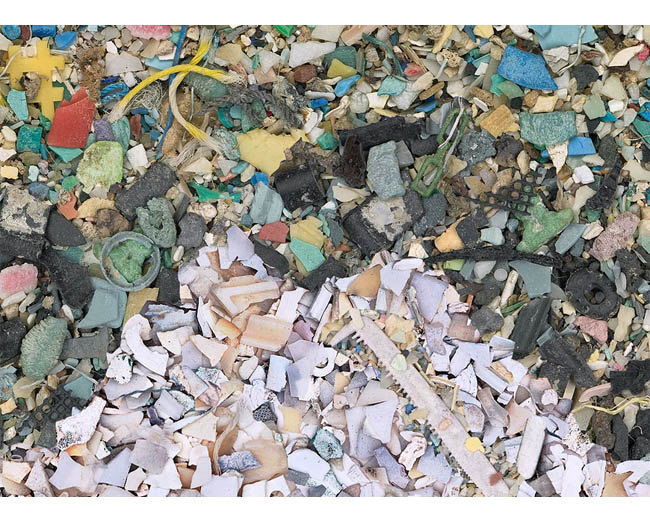
Tags: Green, Photography
Posted in Uncategorized | 1 Comment »
Monday, 20 April 2009
An iconic Canadian post-impressionist artist, Tom Thomson’s paintings are centred around idyllic Canadian landscapes. His works manage that capture that quiet serenity that is the very essence of Canadian landscapes. Every time I come across his work, I am reminded of long hiking trails through beautiful parks that frame these beautiful, placid views at every angle. Tragically, he died at the young age of 39, leaving behind a legacy of works that are now worth millions, like the one pictured below, title “Autumn Foliage”:
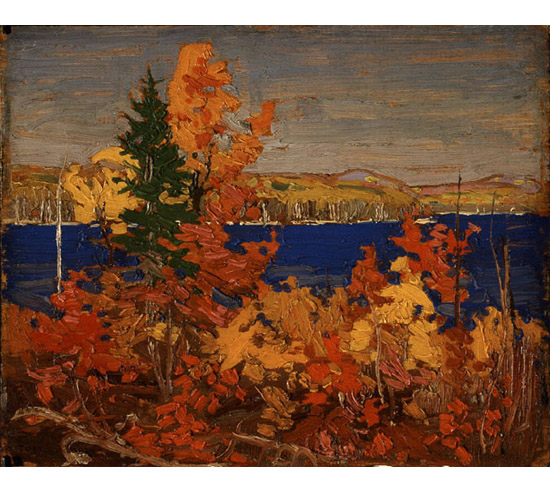
Recently, a new Thomson painting, pictured below, appeared on the market. Titled “Dawn on Round Lake”, it ‘depicts a lake near Algonquin Park, with a deep blue hill rising in the background and bare spindly trees pointing to wisps of clouds… Thomson painted the oil sketch during a hunting trip in 1915 [and] presented the small work as a gift to a doctor friend who had accompanied him… The artwork had been held by the doctor’s family for 94 years, emerging just weeks ago when one of his heirs brought it - by bus and wrapped in a towel.’ (CBC)
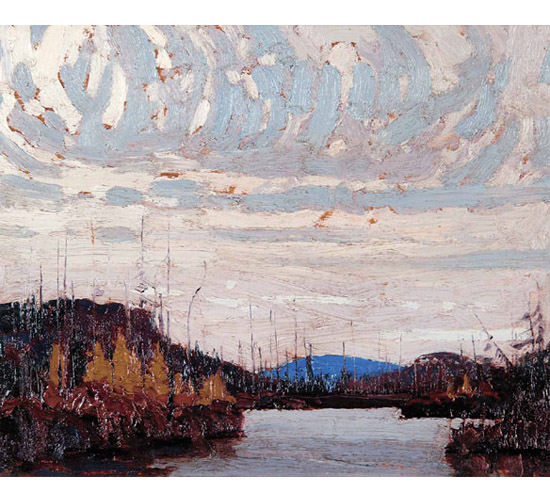
Originally appraised at $600,000, the painting was eventually sold for a mere $350,000 to a rookie art collector. Tom Budd, the new owner, is a very lucky man. And I believe he has the economy to thank for this rare Canadian gem.
Tags: Art, Canada, Painting
Posted in Uncategorized | No Comments »























